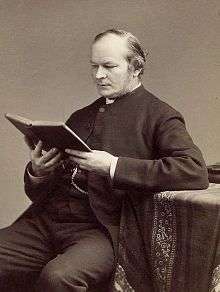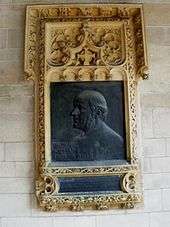Frederic Farrar
| Frederic William Farrar | |
|---|---|
 | |
| Born |
7 August 1831 Bombay, India |
| Died |
22 March 1903 (aged 71) Canterbury, Kent, England |
| Occupation | Cleric, writer |
| Nationality | English |
| Alma mater | |
| Period | 19th century |
| Genre | Theology, children's literature |
Frederic William Farrar (Bombay, 7 August 1831 – Canterbury, 22 March 1903) was a cleric of the Church of England (Anglican), schoolteacher and author. He was a pallbearer at the funeral of Charles Darwin in 1882. He was a member of the Cambridge Apostles secret society.
Biography
Farrar was born in Bombay, India, and educated at King William's College on the Isle of Man, King's College London and Trinity College, Cambridge.[1] At Cambridge he won the Chancellor's Gold Medal for poetry in 1852.[2] He was for some years a master at Harrow School and, from 1871 to 1876, the headmaster of Marlborough College.
Farrar became successively a canon of Westminster and rector of St Margaret's, Westminster (the church next to Westminster Abbey), archdeacon of Westminster Abbey and the Dean of Canterbury; he also served as chaplain in ordinary.[3] He was an eloquent preacher and a voluminous author, his writings including stories of school life, such as Eric, or, Little by Little and St. Winifred's about life in a boys' boarding school in late Victorian England, and two historical romances.
Farrar was a classics scholar and a comparative philologist, who applied Charles Darwin's ideas of branching descent to the relationships between languages, engaging in a protracted debate with the anti-Darwinian linguist Max Müller.[4] While Farrar was never convinced by the evidence for evolution in biology, he had no theological objections to the idea and urged that it be considered on purely scientific grounds.[5] On Darwin's nomination, Farrar was elected to the Royal Society in 1866 for his philological work. When Darwin died in 1882, Farrar helped get the church's permission for him to be buried in Westminster Abbey and preached the sermon at his funeral.[5]
Farrar's religious writings included Life of Christ (1874), which had great popularity, and Life of St. Paul (1879). His works were translated into many languages, especially Life of Christ.
Farrar believed that some could be saved after death.[6][7] He originated the term "abominable fancy" for the longstanding Christian idea that the eternal punishment of the damned would entertain the saved.[8] Farrar published Eternal Hope in 1878 and Mercy and Judgment in 1881, both of which defend his position on hell at length.[6][9]
Farrar was accused of universalism, but he denies this belief with great certainty. In 1877 Farrar in an introduction to five sermons he wrote, in the preface he attacks the idea that he holds to universalism. He also dismisses any accusation from those who would say otherwise. He says, "I dare not lay down any dogma of Universalism, partly because it is impossible for us to estimate the hardening effect obstinate persistence in evil, and the power of the human will to resist the love of God."[9]
In April 1882, he was one of ten pallbearers at the funeral of Charles Darwin in Westminster Abbey; the others were: The Duke of Devonshire, The Duke of Argyll, The Earl of Derby, Mr. J. Russell Lowell, Mr. W. Spottiswoode, Sir Joseph Hooker, Mr. A. R. Wallace, Professor Huxley, and Sir John Lubbock.[10][11]
Family

In 1860, he married Lucy Mary Cardew; they had five sons and five daughters.[10] Farrar's daughter, Maud, was the mother of World War II British field marshal Bernard Montgomery. His son Reginald published a biography of Farrar in 1902.[5] He died on 22 March 1903, and was buried in the cloister of the Canterbury Cathedral.[10]
Farrar has a street named after him – Dean Farrar Street in Westminster, London. There is also a memorial to him at the church of St Margret's, Westminster by the sculptor Nathaniel Hitch.
Works
- An Essay on the Origin of Language (1860)
- Chapters on Language (1865)
- Life of Christ (1874)
- Eternal Hope (1878)
- The Vow of the Nazarite (1879)
- Mercy and Judgement (1881)
- Life and Works of St. Paul (1879)
- History of Interpretation (1886)
- Lives of the Fathers Volume 1 (1889)
- Lives of the Fathers Volume 2 (1889)
- The Voice from Sinai (1892)
- The Bible: Its Meaning and Supremacy (1897)
Fiction
- Eric, or Little by Little, a school story (1858)
- St Winifred's, or The World of School (1862)
- Julian Home, a college story (Est 1870–1890)
- Darkness and Dawn, or Scenes in the Days of Nero (1891)
- Gathering Clouds: A Tale of the Days of St. Chrysostom (1895)
Notes
- ↑ "Farrar, Frederic William (FRR849FW)". A Cambridge Alumni Database. University of Cambridge.
- ↑ University of Cambridge (1859). A Complete Collection of the English Poems which Have Obtained the Chancellor's Gold Medal in the University of Cambridge (PDF). Cambridge: W. Metcalfe. Retrieved 1 October 2008.
- ↑ A Famous Churchman, in the Red River Prospector, published 2 May 1901; retrieved 17 May 2014
- ↑ Alter, Stephen G. (1991). Darwinism and the Linguistic Image: Language, Race, and Natural Theology in the Nineteenth Century. Baltimore and London: The Johns Hopkins University Press.
- 1 2 3 Farrar, Reginald (1902). The life of Frederic William Farrar, D.D., F.R.S., etc., sometime dean of Canterbury. New York: T.Y. Crowell.
- 1 2 F. W. Farrar. Mercy and Judgment. 1881.
- ↑ The Eternal Fate of Unbelievers, Part II, "The Witness of Church History (2): The Modern Period", excerpted and adapted from Hell on Trial: The Case for Eternal Punishment by Robert A. Peterson (Phillipsburg, N.J.: Presbyterian and Reformed Publishing), 1995, Extract by Garry J. Moes.
- ↑ The Decline of Hell: Seventeenth-Century Discussions of Eternal Torment. Walker DP. Chicago: University of Chicago Press, 1964
- 1 2 "Eternal Hope" by Rev. Frederic W. Farrar,(New York:E.P. Dutton & Company, 1878), xvi and xxi.
- 1 2 3
 Bayne, Ronald (1912). "Farrar, Frederic William". In Lee, Sidney. Dictionary of National Biography, 1912 supplement. London: Smith, Elder & Co.
Bayne, Ronald (1912). "Farrar, Frederic William". In Lee, Sidney. Dictionary of National Biography, 1912 supplement. London: Smith, Elder & Co. - ↑ The Funeral of Mr Darwin, The Times, 27 April 1882. (Wikisource)
References
- Attribution
 This article incorporates text from a publication now in the public domain: Cousin, John William (1910). "Farrar, Frederic William". A Short Biographical Dictionary of English Literature. London: J. M. Dent & Sons. Wikisource
This article incorporates text from a publication now in the public domain: Cousin, John William (1910). "Farrar, Frederic William". A Short Biographical Dictionary of English Literature. London: J. M. Dent & Sons. Wikisource- Norman Vance. "Farrar, Frederic William (1831–1903)". Oxford Dictionary of National Biography (online ed.). Oxford University Press. doi:10.1093/ref:odnb/33088. (Subscription or UK public library membership required.)
External links
| Wikiquote has quotations related to: Frederic Farrar |
| Wikisource has original works written by or about: Frederic William Farrar |
| Wikimedia Commons has media related to Frederic William Farrar. |
- Works by Frederic William Farrar at Project Gutenberg
- Works by or about Frederic Farrar at Internet Archive
| Church of England titles | ||
|---|---|---|
| Preceded by Robert Payne Smith |
Dean of Canterbury 1895–1903 |
Succeeded by Henry Wace |